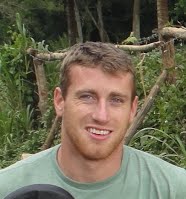Mark Carlberg

Mark Carlberg grew up in Skaneateles, New York, and completed his undergraduate studies at the Pennsylvania State University. Carlberg is a second year medical student at SUNY Upstate Medical University in Syracuse. Professionally, Carlberg aims to work with under-served populations in rural areas. In his free time, he can often be found traveling, meeting new people, and enjoying outdoor sports like white water kayaking, mountain biking, skiing, surfing etc.

Project: "Dengue Virus Diversity in Northern Thailand"
June 2, 2013 - July 31, 2013
Bangkok, Thailand
What does the Kean Fellowship mean to you?
The Kean Fellowship is an excellent opportunity to explore an area of medicine that is not commonly seen or emphasized in Upstate New York but affects billions of people around the world. I was incredibly excited to learn of this opportunity and honored to be chosen as a recipient. Without the fellowship I would not have the opportunity to explore tropical diseases, like Dengue, before entering the fairly rigid schedule that will comprise the next three years of medical school.
What do you anticipate learning?
The fellowship offers an excellent opportunity to explore exciting areas in tropical medicine and a chance to be immersed and live in a community and culture very different from my own. I have not yet had a chance to experience medicine in a research setting and although I eventually plan to practice clinical medicine I think it is important to have a foundation of knowledge in the laboratory. It is also important to experience and be cognizant of the cultural nuances that exist in a clinical setting while practicing medicine in a foreign area. I will also see infectious diseases rarely seen in the US and have the opportunity to utilize the technology used in virology.
What interests you about tropical medicine and what problems are you interested in solving?
I’m interested in the epidemiology and pathogenesis of dengue virus. Invasive species such as the Asian Tiger mosquito (Aedes albopictus) have made their way to many corners of the globe including the east coast of the US and have the potential to spread diseases typically limited to the tropics such as chikungunya and dengue. It is important to recognize the impact and burden these diseases have in tropical nations and the continued expansion of their vectors with the prospect of climate change.